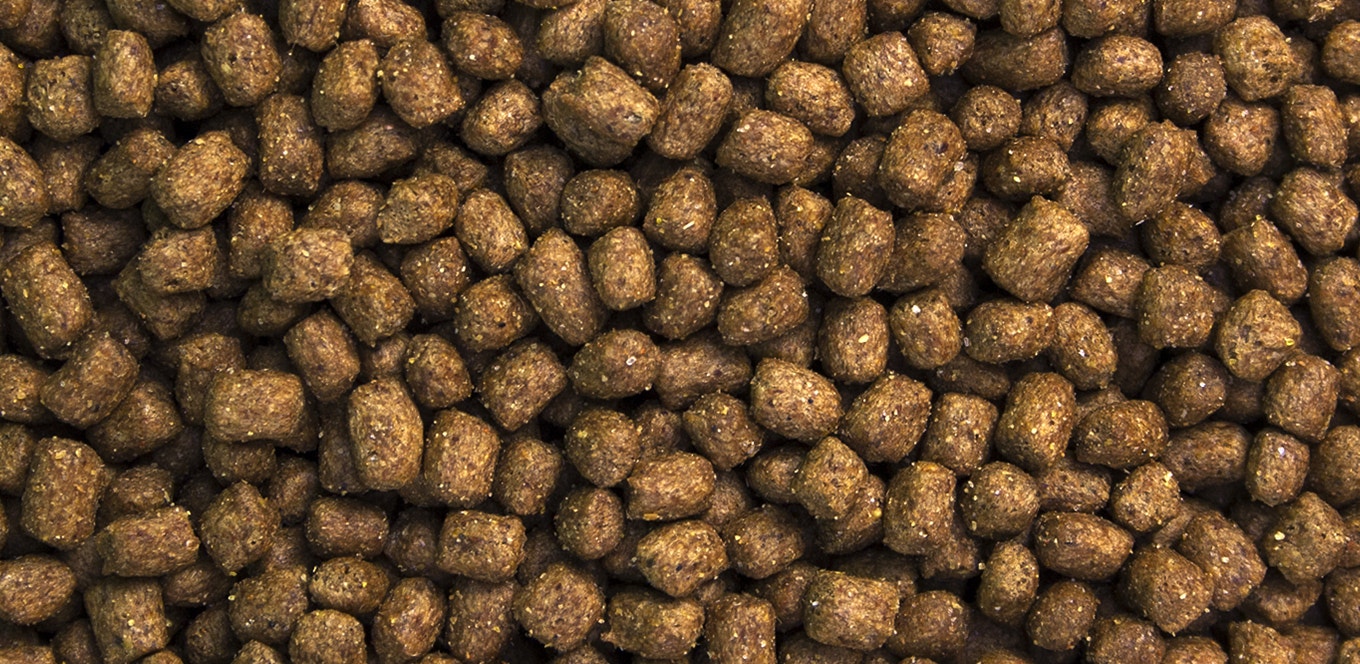

Your puppy is changing in so many ways. In fact, the most rapid growth will take place in these first months of his life. His immune system is developing. Bones are growing. Muscles are getting stronger. All of this requires a nutrient-dense diet, formulated to support a medium-breed puppy's rate of development. To make sure your puppy is getting optimal nutrition to protect and maintain health and well-being, here are some key points to keep in mind.
From the time your puppy is weaned until 4 months of age, you should feed your puppy two to three meals a day, with the daily amount based on the guidelines of the food label. After 4 months of age, he should be fed twice a day on a regular schedule. Always have fresh water available.
Research shows that puppies need up to twice as much energy as adult dogs. Dramatic growth at this stage means your puppy requires an energy-rich, nutrient-dense complete and balanced diet. Puppies also require more protein than adult dogs. High-quality animal-based protein will help your puppy create new body tissue.
Not all puppies have the same nutritional needs. Medium-breed puppies actually have slightly higher metabolism rates per pound than large-breed puppies. And your puppy will reach his mature adult weight at about 12 months, sooner than larger breeds that reach adulthood as late as 24 months. Your puppy needs protein, fat, calcium, and phosphorus to support growth and development of bones, muscles, and other tissues. So giving him a food that supports his medium size is the easiest way to help make sure he's getting the right balance of nutrients for his metabolism and growth rate.
Remember, puppies have small stomachs. Make sure his food is nutrient-dense so he'll get a complete and balanced diet even though his stomach can only handle what seems like a small volume of food.
Aside from energy and protein, there are other important nutrients and ingredients vital to your puppy's diet:
These are important building blocks of nutrition. Look for them when you choose dry or canned dog food and when you select treats.
A medium-breed puppy reaches adult weight by about 12 months. You can begin feeding an adult dog food at this time, such as IAMS™ ProActive Health™ Adult MiniChunks. Your dog might not welcome the change at first, but don't worry. You can help ease the transition by gradually introducing the adult food. Try mixing 25% of the new food with 75% of his puppy food, then gradually change the proportions over the next three days until he's eating 100% adult food.



Antioxidants are naturally-occurring essential nutrients that help maintain your dog’s health by slowing the destructive oxidative process of cellular molecules. IAMS™ research has been focusing on advancing antioxidant nutrients for senior dogs — and the benefit is improved immune function. Discover how the antioxidants in IAMS™ products can benefit your dog’s health in a number of ways.
Antioxidants are found naturally in fruits and vegetables. Common antioxidants include vitamin A, vitamin C, vitamin E, and certain compounds called carotenoids (like lutein and beta-carotene). When antioxidants are a part of a dog’s complete diet, they can provide the following benefits:
As cells function normally in the body, they produce damaged molecules called free radicals. These free radicals are highly unstable and steal components from other cellular molecules such as fat, protein, or DNA, thereby spreading the damage.
This continues in a chain reaction, and causes cells to die. This process is called peroxidation. Peroxidation is useful because it helps the body destroy cells that have outlived their usefulness, and it kills germs and parasites. However, when left unchecked, peroxidation also destroys or damages healthy cells.
Antioxidants help prevent widespread cellular destruction by willingly donating components to stabilise free radicals. More importantly, antioxidants return to the surface of the cell to stabilise other cellular components.
When there are not enough antioxidants to hold peroxidation in check, free radicals begin damaging healthy cells, which can lead to problems. For example, free radical damage to immune cells can lead to an increased risk of infections.
Antioxidants offer countless benefits to our furry friends. And it is imperative that their food is loaded with it. Want to know why? Read on.
Antioxidants are a must for dogs as they are exposed to significantly more toxins than humans. These antioxidants work like protective agents within the dog’s body, battling free radicals that cause symptoms and diseases like skin problems.
Furthermore, giving liver antioxidants for dogs will boost liver health and eliminate toxins from their body more efficiently. The liver will convert fat-soluble toxins into water-soluble toxins to easily flush them from your pet’s body through the GI tract and kidneys.
Recent research has examined the benefits of certain antioxidants on the immune response of dogs, and the results of these studies indicated that antioxidants are important in helping dogs maintain a healthy immune system.
IAMS™ adult and puppy formulas contain optimal levels of antioxidants such as:
|
|---|
Now that you know how dog food with antioxidants can benefit your dog, here’s a list of the best antioxidants for dogs:
You can find natural antioxidants for dogs in the following:
The antioxidant content of plant-based foods is high. Foods that are highest in antioxidants are fruits and vegetables as they are loaded with vitamins and beneficial in countless ways. Some examples of excellent sources of antioxidants are blueberries, strawberries, pears, red cabbages, and kale. Make sure to check which fruits and vegetables are safe for your dog to consume.
Give your dog the best vitamins you can, so your pooch stays healthy. It is crucial that dogs receive a supplement that is specifically designed for their life stage.
Look for dog food with antioxidants and nutrients that are bioactive and bioavailable so that these get absorbed properly into your dog’s body. Make sure that the supplement you choose has the ideal ratio of natural elements for your pet’s needs. That can be accomplished by looking for a combination of prebiotics, antioxidants, vitamins, and minerals.
For a healthy body from the inside, you can also feed your pooch IAMSTM Proactive HealthTM dog food. Find the products that are best for your dog by shopping based on your pet’s age.
